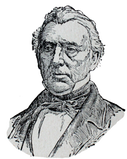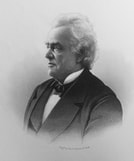the merchants
Today's South Church brick meetinghouse was the product of a rivalry between the town's two leading merchants — vying to capture the business of the shire town they helped create.
james breck (1780–1871)
A 24-year-old merchant of Scottish descent, James Breck moved from Claremont to Croydon (NH) in 1804, the same year that the Croydon Turnpike was chartered. Breck served Croydon as selectman and representative in the state legislature. In 1816, he moved down to Newport and constructed a brick store at the corner of Main and Elm Streets. The structure was removed in 1979 for road improvements. Breck belonged to the Congregational Society but was not a church member. Nevertheless, he financed a new meetinghouse, made of brick, on the eastern side of the Sugar River—quite near his store. Often listed as the highest tax-payer in Newport, James Breck served for many years as selectman and state representative. In 1842, he moved his large family to Rochester (NY) where new opportunities stemmed from the completion of the Erie Canal. He again opened a mercantile business, which he and one of his sons operated until his death in 1871; the son died just five years later.
|
william cheney (1776–1830)
Born in Alstead (NH) in 1776, William Cheney moved to Newport in 1807. His first store was located in the Enoch Noyes house, west of the Sugar River. He built the Richards Block east of the river in 1810 and relocated his business. He then built Nettleton's Hotel and the Tontine, a huge, wooden building with stores and mechanic's shops. During 1815, he constructed dams and several mills and later built several more mills at the outlet of Sunapee Harbor. A Baptist church deacon, he provided the land for a new wooden church, built in 1821. Working with James Breck, he established Newport as the seat of the newly-formed Sullivan County, ensuring a steady business for the town's hospitality industry as people traveled to Newport to conduct their legal affairs. William Cheney died of consumption in 1830. His business interests were assumed by his sons, most of whom soon left Newport. His youngest, James Edwin Cheney, then in his early twenties, started a mercantile business in Rochester (NY) where James Breck had resettled in 1842.
|